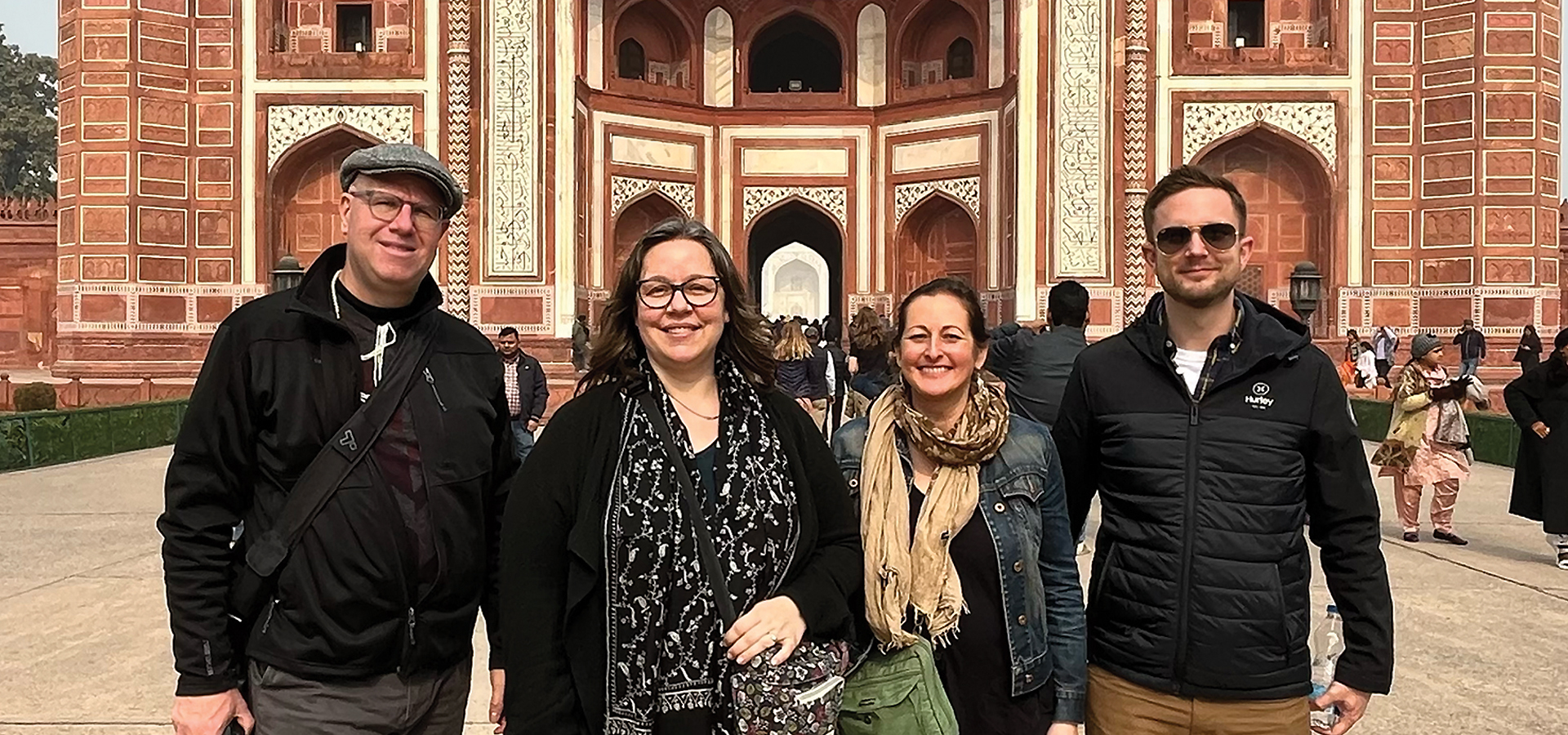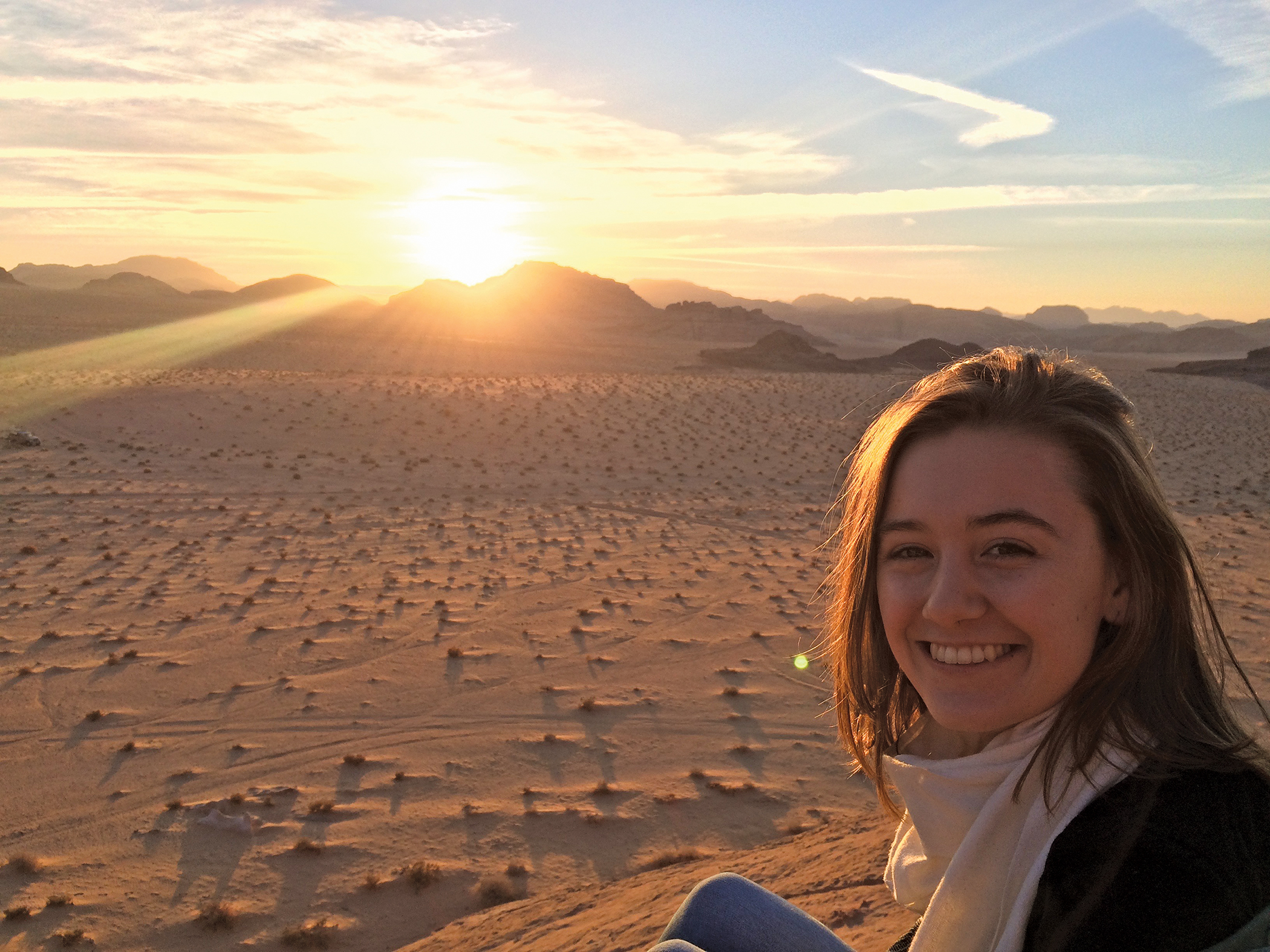In Exchange: A STEM Excursion to India

In January 2023, a trio of Wesleyan faculty—Anna Shusterman, professor of psychology and education studies, Joe Coolon, associate professor of biology and integrative sciences, and Erika Taylor, associate professor of chemistry—made an 18-hour journey to Shiv Nadar University and Ashoka University, a pair of liberal arts–minded, Wesleyan-sized institutions located in India. They were there to trade knowledge with colleagues in their same fields, meet students, and take in the cultural tapestries of Delhi, Mumbai, and beyond. And by building connections in South Asia, the trio returned with new perspectives and budding professional collaborations.
The trip was funded by the Department of Education’s Undergraduate International Studies and Foreign Language (UISFL) grant program, which has helped support a range of programming at Wesleyan like Hindi-Urdu language instruction, the annual Navaratri Festival, and four STEM-centered excursions to the subcontinent, including the pandemic-delayed January 2023 trip. In January 2020, a group of faculty paid a visit; three students spent several weeks in summer 2019 working in laboratories at Mumbai’s Indian Institute of Technology; and another student cohort is slated to visit this summer.
Coolon saw the fruits of the program firsthand: One of his undergraduate students participated in the 2019 trip and returned with newfound molecular biology benchwork skills, while one of his current PhD students, Siddhant Kalra, first learned about Wesleyan while studying in Delhi when Wesleyan faculty made their visit in 2020. Taylor’s interest in the opportunity, meanwhile, stemmed from India’s recent innovations in biotech. “I see India as a rising force,” Taylor says, noting that the country produced some of the most efficacious COVID vaccines, “but I also loved the opportunity to learn about other places and other people, and get out of my comfort zone.”
The Wesleyan contingent—accompanied by Peter Gottschalk, co-coordinator of the South Asian Studies minor, who’s returned to India frequently since 1985—embarked on a journey focused on Delhi and Mumbai. The locus of the trip was on Shiv Nadar and Ashoka, schools on the periphery of Delhi that are part of a larger swell of private higher education institutions emerging in 21st-century India. Coolon and Taylor met with their counterparts, toured state-of-the-art laboratories, and led impromptu seminars for upwards of 160 students, answering nuanced questions on biology and chemistry and introducing Wesleyan as a potential place for the students’ future studies. Throughout the trip, Coolon saw his Indian counterparts looking at scientific questions through a more holistic lens. “They were approaching human health, which is ultimately what a lot of science is about, more from the point of thinking about the influence of the environment,” Coolon says. “I think this new focus has great promise for major advancement in both basic and applied sciences.”
Through one of her lab managers, Pritha Sengupta, Shusterman connected with Madhavi Maganti, who recently established a state-of-the-art infant cognition research lab in the neonatology department of a Delhi hospital, which could be the first of its kind in India. “Psychology has a problem with WEIRD science: Western, educated, industrialized, rich, democratic societies are where most of our research comes from, which is not actually representative of the rest of the world,” Shusterman says. “It’s important to find out if the science we think we know generalizes to a really different context. In my opinion, every single study Madhavi is doing in this lab is important.” At Maganti’s request, Shusterman led a spontaneous, off-the-cuff seminar on infant cognition and psychology for about 15 hospital residents.
In the months since the trip, the University has sought to build on its relationships with the subcontinent. The chemistry department will welcome a Fulbright Scholar-in-Residence from India for the coming academic year. Taylor has begun formulating plans to return to Shiv Nadar to co-teach a drug discovery class during her next sabbatical. For Coolon, what began with an offhanded question about Osiris proteins—a family of insect-specific proteins that hold great promise in advancements in crop pest control—has blossomed into a cross-continental collaboration with Dilip Kumar, a structural biologist at Ashoka, in which the pair are sharing data and working on a three-dimensional model that could shine new light on the protein’s function.
“One of the most eye-opening parts of the trip was how much everyone benefits from the exchange of people, of ideas, and more interaction between US-based institutions and these newer, liberal arts–focused institutions in India,” Coolon says. “There’s just so much potential for exchange—in all its different meanings—that I wasn’t at all aware of. It’s really important for that exchange to occur in both directions.”
Top photo: In early 2023, Wesleyan professors Peter Gottschalk, Erika Taylor, Anna Shusterman, and Joe Coolon (left to right) embarked on a STEM-focused trip to India.
To learn more about student and alumni experiences abroad, read Discovering the Unexpected through Study Abroad and Alumni Abroad: The Peace Corps.

